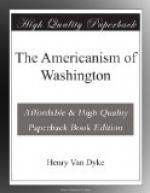This is the truth that emerges, crystalline and luminous, from the conflicts and confusions of the Revolution. The men who were able to surrender themselves and all their interests to the pure and loyal service of their ideal were the men who made good, the victors crowned with glory and honor. The men who would not make that surrender, who sought selfish ends, who were controlled by personal ambition and the love of gain, who were willing to stoop to crooked means to advance their own fortunes, were the failures, the lost leaders, and, in some cases, the men whose names are embalmed in their own infamy. The ultimate secret of greatness is neither physical nor intellectual, but moral. It is the capacity to lose self in the service of something greater. It is the faith to recognize, the will to obey, and the strength to follow, a star.
Washington, no doubt, was pre-eminent among his contemporaries in natural endowments. Less brilliant in his mental gifts than some, less eloquent and accomplished than others, he had a rare balance of large powers which justified Lowell’s phrase of “an imperial man.” His athletic vigor and skill, his steadiness of nerve restraining an intensity of passion, his undaunted courage which refused no necessary risks and his prudence which took no unnecessary ones, the quiet sureness with which he grasped large ideas and the pressing energy with which he executed small details, the breadth of his intelligence, the depth of his convictions, his power to apply great thoughts and principles to every-day affairs, and his singular superiority to current prejudices and illusions—these were gifts in combination which would have made him distinguished in any company, in any age.
But what was it that won and kept a free field for the exercise of these gifts? What was it that secured for them a long, unbroken opportunity of development in the activities of leadership, until they reached the summit of their perfection? It was a moral quality. It was the evident magnanimity of the man, which assured the people that he was no self-seeker who would betray their interests for his own glory or rob them for his own gain. It was the supreme magnanimity of the man, which made the best spirits of the time trust him implicitly, in war and peace, as one who would never forget his duty or his integrity in the sense of his own greatness.
From the first, Washington appears not as a man aiming at prominence or power, but rather as one under obligation to serve a cause. Necessity was laid upon him, and he met it willingly. After Washington’s marvellous escape from death in his first campaign for the defence of the colonies, the Rev. Samuel Davies, fourth president of Princeton College, spoke of him in a sermon as “that heroic youth, Colonel Washington, whom I can but hope Providence has hitherto preserved in so signal a manner for some important service to his country.” It was a prophetic voice,




